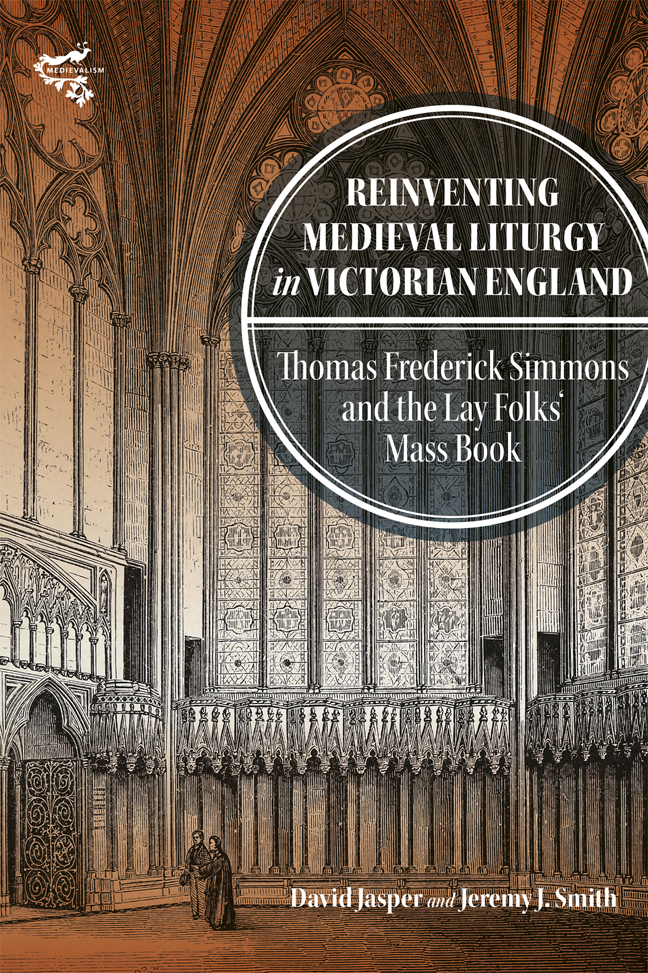 Reinventing Medieval Liturgy in Victorian England
Reinventing Medieval Liturgy in Victorian England Book contents
- Frontmatter
- Dedication
- Contents
- List of Plates
- Preface
- A note on citations
- List of abbreviations
- Introduction: Imagining the Past
- 1 Thomas Frederick Simmons and The Lay Folks’ Mass Book
- 2 Re-imagining Medieval Devotion: Nineteenth-Century Conceptions of the English Church
- 3 Simmons and the Early English Text Society
- 4 Simmons as Editor: The Philologist
- 5 Simmons as Editor: The Liturgist
- 6 Simmons as Parish Priest, and Liturgical Reform in the Victorian Church of England
- 7 The Afterlives of The Lay Folks’ Mass Book
- Conclusion: Liturgical Moments in Time
- Plates
- Appendix I The Lay Folks’ Mass Book: Text and Translation
- Appendix II The Lay Folks’ Mass Book and the Sarum Rite
- Bibliography
- Index
- Miscellaneous Endmatter
7 - The Afterlives of The Lay Folks’ Mass Book
Published online by Cambridge University Press: 02 March 2024
- Frontmatter
- Dedication
- Contents
- List of Plates
- Preface
- A note on citations
- List of abbreviations
- Introduction: Imagining the Past
- 1 Thomas Frederick Simmons and The Lay Folks’ Mass Book
- 2 Re-imagining Medieval Devotion: Nineteenth-Century Conceptions of the English Church
- 3 Simmons and the Early English Text Society
- 4 Simmons as Editor: The Philologist
- 5 Simmons as Editor: The Liturgist
- 6 Simmons as Parish Priest, and Liturgical Reform in the Victorian Church of England
- 7 The Afterlives of The Lay Folks’ Mass Book
- Conclusion: Liturgical Moments in Time
- Plates
- Appendix I The Lay Folks’ Mass Book: Text and Translation
- Appendix II The Lay Folks’ Mass Book and the Sarum Rite
- Bibliography
- Index
- Miscellaneous Endmatter
Summary
The Church Quarterly Review
That Simmons’ Work was taken very seriously in his time is evidenced by a lengthy and – in accordance with contemporary fashion – anonymous review of his edition, in the Church Quarterly Review (CQR), the high-church journal encountered in the previous chapter. Discussion of Simmons’ work is there linked to reviews of the work of Maskell (Monumenta Ritualia Ecclesiae Anglicanae), of Henderson on the York Rite, and of H. T. Kingdon (Vice-Principal of what was then Salisbury Theological College), and of the third Marquess of Bute.
Beginning with the Roman liturgy, and ‘books provided for the use of Roman Catholic laymen in England’, the CQR review goes on to observe that ‘since the early days of the Catholic revival, the study of our early insular services has received considerable impulse’. Reference is made to Palmer’s Origines Liturgicae, and to the recognition by Isaac Williams that attention to the Sarum Use quickly dispels the false assumption of ‘innovations on the part of the Reformers’. After Newman in 1839, Williams had brought to popular attention ‘the hymns of a nearer continental Breviary (the Parisian, no longer now a living use.)’ The developing understanding of the history and forms of the BCP is noted alongside such works as Scudamore’s Notitia Eucharistica (1866), Medd’s The Priest to the Altar (1861), John Fuller Russell’s (1813–1884) Hierurgia Anglicana, published for the Cambridge Camden Society in 1848, (and re-edited by Vernon Staley in 1902), and – another work already referred to – Proctor’s History of the Book of Common Prayer (1855), which remains even today in authoritative use through its substantial revision by Walter Howard Frere (1901).
The CQR review-article continues with a substantial bibliographical commen-tary on nineteenth-century scholarship in the medieval English liturgical tradition, beginning with Francis Henry Dickinson’s still useful List of Printed Service Books, According to the Ancient Uses of the Anglican Church (London, 1850), and with texts of breviaries, missals and pontifical published by the Bannatyne Club, and, in particular, the Surtees Society. Significant also is the publication of C. Walker’s Sarum Missal in English.
The writer in the CQR, like most of his contemporaries and unlike their modern successors, accepts Simmons’ thesis about the identity of ‘Dan Jeremy’ and the French origin of the LFMB in Rouen without question, and also acknowledges Simmons’ interest in language and dialect.
- Type
- Chapter
- Information
- Reinventing Medieval Liturgy in Victorian EnglandThomas Frederick Simmons and The 'Lay Folks' Mass Book', pp. 145 - 164Publisher: Boydell & BrewerPrint publication year: 2023


